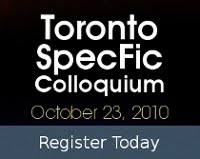Speculative poetry, huh? Talk about ghetto buried in the basement of the already ghetto-ized lands of science fiction, horror, and fantasy. I was working CZP's table at the dealer's room and, after selling somewhere in the vicinity of forty books, everyone was most astounded to discover I had even sold - wait for it! - a book of poetry! (And that book was The Animal Bridegroom
Having been asked to participate as a judge in the Rannu Fund Poetry Competition some time ago, I found myself wondering exactly what constituted speculative fiction poetry. Surely it must be about more than tropes, more than the trappings of genres, the familiar characters, the sly references to technology. My earlier post, which picks up upon Margaret Atwood's definition of "speculative fiction," shows that there's still controversy about what constitutes that genre (as separate from science fiction). Is it as simple as stating that speculative fiction poetry has vampires or aliens or monsters?
Suzette Haden Elgin, founder of the Science Fiction Poetry Association defines it as being "about a reality that is in some way different from the existing reality." I think she's on to something. In my opinion, speculative fiction works precisely because it does something not because it is something. It makes us think about the world in new ways. It makes us re-evaluate the pillars of our society, its values, customs, mores, habits, and project forward to come face to face with the consequences of our actions. It loosens the fixtures that bind us into thinking that this is the way things are because it has always been the way things are.
But when it comes to poetry, though, the line is increasingly blurry. Poetic language works on the very premise of pushing at the boundaries of reality. Anne Carson, author of the Autobiography of Red
"What is an adjective? Nouns name the world. Verbs activate names. Adjectives come from somewhere else ... These small imported mechanisms are in charge of attaching everything in the world to its place in particularity. They are the latches of being."
But if nouns, verbs, and adjectives construct reality as Carson proposes, if they name it, activate it, latch it to the *real*, then isn't all poetry halfway there already? Shakespeare writes, "Shall I compare you to a summer's day?" He speculates. He uses the subjunctive. He tiptoes around naming, offers us glimpses. A metaphor or simile is designed precisely to transmute one thing into another, to make it like another thing. Is that not already beginning to alter reality, to confuse the process of naming?
Any fantasist will tell you that poetry is a kind of magic. That's why wizards speak in rhymes and fear to be named. Language offers us the ropes to bind reality, but it also gives us the tools to unleash it. To let it roam free in the woods, pouncing on passersby.
Poetry is language compressed, made to do tricks, set up to spark and hiss in our minds. Good poetry is, anyway. Just look at the words of Bruce Boston
Helen Marshall spends the majority of her time pursuing a Ph. D. in Medieval Studies at the University of Toronto where she gets to travel across England to examine fourteenth-century manuscripts. Of course, her fascination with the making and writing of books extends well into the present. Her poetry has been published in ChiZine, NFG and the Ontarion Arts Supplement. "Mist and Shadows," published originally in Star*Line, appeared in The 2006 Rhysling Anthology: The Best Science Fiction, Fantasy and Horror Poetry of 2005." "The Gypsy" and "Crossroads and Gateways" both received honourable mentions in the 2009 Rannu Fund Contest, while four other poems were short-listed.










No comments:
Post a Comment